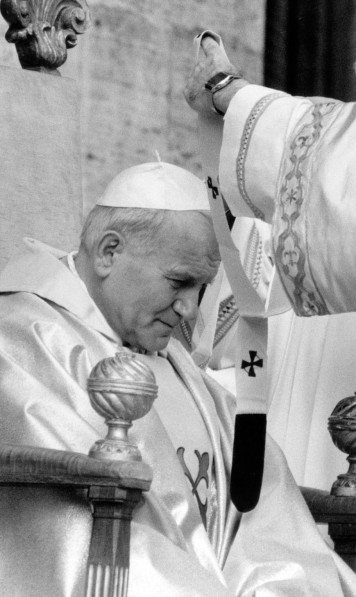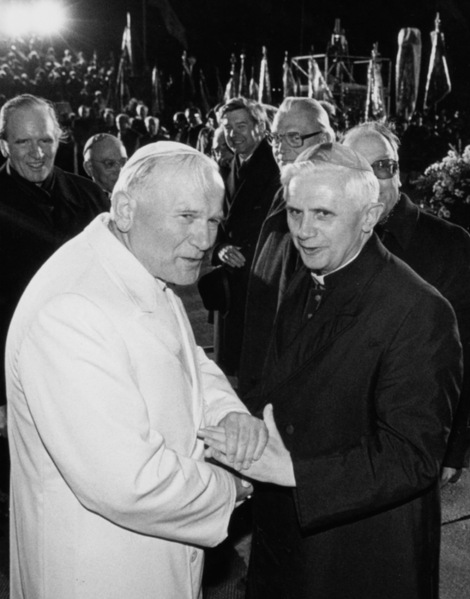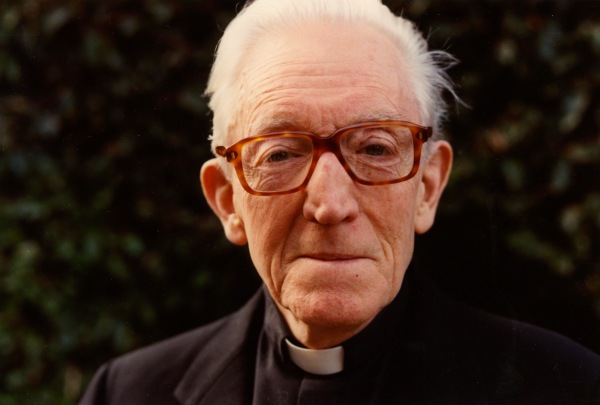Espionage at the Vatican
Posted on October 31, 2013 by Carol Glatz
VATICAN CITY — Claims of eavesdropping on the Vatican are nothing new.
But it’s hard to imagine any current foreign snooping could match the spying frenzy of the Cold War when the communist “East” and democratic “West” were locked in an ideological battle.
 After Polish Cardinal Karol Wojtyla was elected Pope John Paul II in 1978, the Vatican did come under increased scrutiny as it was seen to be a decisive player in the anti-communist chess game.
After Polish Cardinal Karol Wojtyla was elected Pope John Paul II in 1978, the Vatican did come under increased scrutiny as it was seen to be a decisive player in the anti-communist chess game.
Apparently double agent priests infiltrated the upper echelons of the Vatican and Czechoslovakian spies reportedly bugged the private studio of then-Vatican Secretary of State Cardinal Agostino Casaroli by planting a hidden microphone inside a statue of Our Lady.
Cardinal Joseph Ratzinger was spied on for three decades before he became pope by the Stasi — East Germany’s communist secret police.
 According to one agent, the cardinal prefect of the Vatican’s Congregation for the Doctrine of the Faith “would have an influence on the growth of anti-communist attitudes in the Catholic Church, especially in Latin America.” Agents wrote that Pope John Paul asked Cardinal Ratzinger to organize help for “counterrevolutionary activities in Poland” after the rise of the Solidarity movement in 1980.
According to one agent, the cardinal prefect of the Vatican’s Congregation for the Doctrine of the Faith “would have an influence on the growth of anti-communist attitudes in the Catholic Church, especially in Latin America.” Agents wrote that Pope John Paul asked Cardinal Ratzinger to organize help for “counterrevolutionary activities in Poland” after the rise of the Solidarity movement in 1980.
Details of the Stasi’s activities were published in 2005 by the German newspaper Bild am Sonntag. The Stasi archives show there was one agent in the Vatican who provided “exact details” of the 1978 conclave that elected Pope John Paul II.
The newspaper noted that the secret police had kept an extensive card file on then-Cardinal Ratzinger and had described him as “the most decided opponent of communism in the Vatican.” Spies also described him as appearing “initially shy in conversation,” but that he also possessed “a winning charm.”
Soviet-bloc governments tried to get their Eastern European theology students to spy on the Vatican when they studied in Rome.
 “The poor Soviets believed secret sources more than public information, but that was an illusion,” the late-U.S. Jesuit Father Robert Graham, a historian and longtime Vatican observer, told CNS in 1993.
“The poor Soviets believed secret sources more than public information, but that was an illusion,” the late-U.S. Jesuit Father Robert Graham, a historian and longtime Vatican observer, told CNS in 1993.
“They had to employ very complicated means to get the same information that was in the newspapers,” he said in this old CNS story that ran on page 12 in the Anchor, the diocesan paper of Fall River, Mass.
One longtime Vatican reporter claimed at the time that two Hungarian agents in the 1960s went directly to him instead of to his tidied and edited news reports.
He said the outrageous stories he made up for them were exceeded only by the outrageously bad vodka they gave him each Christmas.
But it’s hard to imagine any current foreign snooping could match the spying frenzy of the Cold War when the communist “East” and democratic “West” were locked in an ideological battle.

Karol Wojtyla receiving the woolen pallium during his installation as Pope John Paul II Oct. 22, 1978. (CNS photo by Arturo Mari)
Apparently double agent priests infiltrated the upper echelons of the Vatican and Czechoslovakian spies reportedly bugged the private studio of then-Vatican Secretary of State Cardinal Agostino Casaroli by planting a hidden microphone inside a statue of Our Lady.
Cardinal Joseph Ratzinger was spied on for three decades before he became pope by the Stasi — East Germany’s communist secret police.

Pope John Paul II greeting Cardinal Joseph Ratzinger at a Munich airport in November 1980 at the end of a papal visit to Germany. (CNS photo from KNA)
Details of the Stasi’s activities were published in 2005 by the German newspaper Bild am Sonntag. The Stasi archives show there was one agent in the Vatican who provided “exact details” of the 1978 conclave that elected Pope John Paul II.
The newspaper noted that the secret police had kept an extensive card file on then-Cardinal Ratzinger and had described him as “the most decided opponent of communism in the Vatican.” Spies also described him as appearing “initially shy in conversation,” but that he also possessed “a winning charm.”
Soviet-bloc governments tried to get their Eastern European theology students to spy on the Vatican when they studied in Rome.

Jesuit Father Robert Graham pictured in Rome in 1992. Father Graham, who died in 1997, was considered an authority on the role of Pope Pius XII during World War II. (CNS photo/Agostino Bono)
“They had to employ very complicated means to get the same information that was in the newspapers,” he said in this old CNS story that ran on page 12 in the Anchor, the diocesan paper of Fall River, Mass.
One longtime Vatican reporter claimed at the time that two Hungarian agents in the 1960s went directly to him instead of to his tidied and edited news reports.
He said the outrageous stories he made up for them were exceeded only by the outrageously bad vodka they gave him each Christmas.
No comments:
Post a Comment